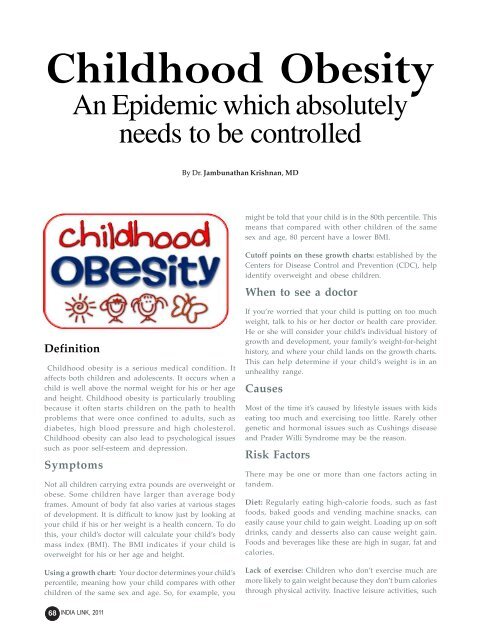6.00 pm Cultural Program - India-Link.org
6.00 pm Cultural Program - India-Link.org
6.00 pm Cultural Program - India-Link.org
You also want an ePaper? Increase the reach of your titles
YUMPU automatically turns print PDFs into web optimized ePapers that Google loves.
Childhood Obesity<br />
An Epidemic which absolutely<br />
needs to be controlled<br />
Definition<br />
Childhood obesity is a serious medical condition. It<br />
affects both children and adolescents. It occurs when a<br />
child is well above the normal weight for his or her age<br />
and height. Childhood obesity is particularly troubling<br />
because it often starts children on the path to health<br />
problems that were once confined to adults, such as<br />
diabetes, high blood pressure and high cholesterol.<br />
Childhood obesity can also lead to psychological issues<br />
such as poor self-esteem and depression.<br />
Symptoms<br />
Not all children carrying extra pounds are overweight or<br />
obese. Some children have larger than average body<br />
frames. Amount of body fat also varies at various stages<br />
of develo<strong>pm</strong>ent. It is difficult to know just by looking at<br />
your child if his or her weight is a health concern. To do<br />
this, your child’s doctor will calculate your child’s body<br />
mass index (BMI). The BMI indicates if your child is<br />
overweight for his or her age and height.<br />
Using a growth chart: Your doctor determines your child’s<br />
percentile, meaning how your child compares with other<br />
children of the same sex and age. So, for example, you<br />
68 INDIA LINK, 2011<br />
By Dr. Jambunathan Krishnan, MD<br />
might be told that your child is in the 80th percentile. This<br />
means that compared with other children of the same<br />
sex and age, 80 percent have a lower BMI.<br />
Cutoff points on these growth charts: established by the<br />
Centers for Disease Control and Prevention (CDC), help<br />
identify overweight and obese children.<br />
When to see a doctor<br />
If you’re worried that your child is putting on too much<br />
weight, talk to his or her doctor or health care provider.<br />
He or she will consider your child’s individual history of<br />
growth and develo<strong>pm</strong>ent, your family’s weight-for-height<br />
history, and where your child lands on the growth charts.<br />
This can help determine if your child’s weight is in an<br />
unhealthy range.<br />
Causes<br />
Most of the time it’s caused by lifestyle issues with kids<br />
eating too much and exercising too little. Rarely other<br />
genetic and hormonal issues such as Cushings disease<br />
and Prader Willi Syndrome may be the reason.<br />
Risk Factors<br />
There may be one or more than one factors acting in<br />
tandem.<br />
Diet: Regularly eating high-calorie foods, such as fast<br />
foods, baked goods and vending machine snacks, can<br />
easily cause your child to gain weight. Loading up on soft<br />
drinks, candy and desserts also can cause weight gain.<br />
Foods and beverages like these are high in sugar, fat and<br />
calories.<br />
Lack of exercise: Children who don’t exercise much are<br />
more likely to gain weight because they don’t burn calories<br />
through physical activity. Inactive leisure activities, such


